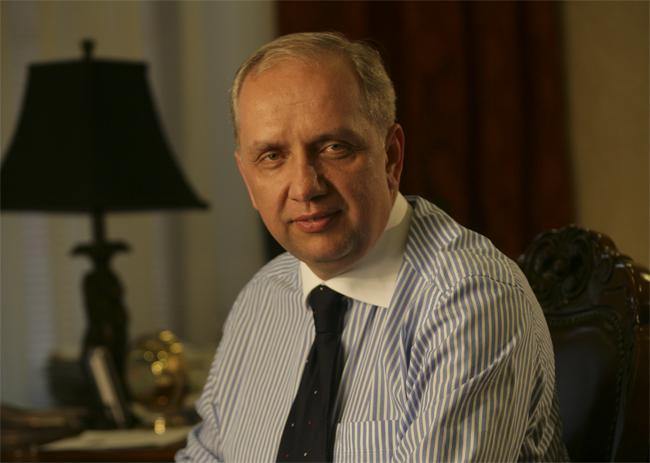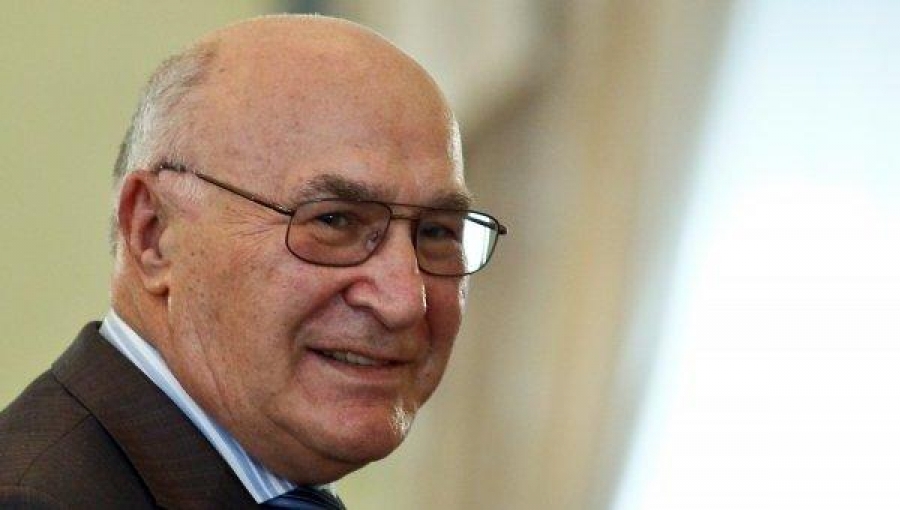Бизнесмен Владимир Клименко, основавший ПАО «Укринком» (ранее Украинский инновационный банк — «Укринкомбанк») и являющийся председателем наблюдательного совета общества, с помощью хитрой схемы вывел «Укринбанк» из перечня ликвидированных Фондом гарантирования вкладов физических лиц, присвоив миллионы гривен. Как работала эта схема и кто такой Клименко читайте в этом материале.
Владимир Клименко, родившийся в 1958 году в Луганске, до 2001 года не мог похвастаться особыми жизненными успехами, хотя должность директора представительства польской фирмы, согласно официальной биографии, давала деньги на жизнь.

Реально Клименко работал в Сумской области как торговец конфискованным цветным металлом, который ему поставлял якобы местный сотрудник СБУ Николай Герасименко. Позже Клименко удачно изменил профиль деятельности и он попал в банковский сектор, став заместителем председателя правления АБ «Клиринговый дом», а уже в следующем году стал менеджером «Брокбизнесбанка». В данном финучреждении он познакомился с Владимиром Стельмахом, дважды занимавшим кресло главы Нацбанка.
Владимир Клименко засветился как миноритарный акционер (9% акций) ПАО «Автокразбанка», который планировалось ликвидировать до 28 августа 2018, а также как временный администратор банка «БИГ Энергия», назначение которого якобы лоббировал лично Владимир Стельмах.

Во время работы Клименко последний был уличен в схеме вывода средств за границу на счета подконтрольных зарубежных структур в один из латвийских банков. По данным налоговой службы, всего за 3 месяца таким образом ушли 875 млн долларов.
Будучи временным администратором банка, он запомнился постоянными обещаниями вкладчикам о возрождении финансового учреждения и наращивании им темпов развития. Как писали СМИ тогда, таким образом администратор, скорее всего, просто пытался привлечь в банк новых вкладчиков, наличные деньги отдавались «своим клиентам» в счет погашения проблемного депозита. Но главным периодом в жизни Владимира Клименко, и самым скандальным, стала его работа в ПАО «Укринбанк».
В 2010 году Владимир Клименко возглавил правление старейшего коммерческого банка — Украинский инновационный банк, чему предшествовала, казалось бы, невероятная история, способствовавшая падению цены банка по меньшей мере в 250 тысяч раз.
Рефинансирование и Израиль
В 2007 году один из наиболее перспективных отечественных банков был готов купить израильский банк Bank Hapoalim за 200 млн долларов. Сами израильтяне были готовы совершить сделку, но требовалось разрешение, во многом формальное, Национального банка. И здесь, по словам тогдашнего председателя правления «Укринбанка» Сергея Мещеряка, начались махинации высокопоставленных должностных лиц, из-за которых впоследствии финучреждение перешло в собственность новых собственников за смешные 4 тыс. гривен.
По словам Сергея Мещеряка, в течение 8 месяцев в НБУ тянули с выдачей разрешения, намекая на необходимость решить вопрос со Стельмахом, что могло стоить 5% суммы соглашения с израильтянами, то есть 10 миллионов долларов. В результате после начала финансового кризиса летом 2008 года израильтяне, так и не получившие разрешения НБУ, отказались от соглашения.
После передачи акций НБУ немедленно выделил банку рефинансирование на 450 млн гривен, а инвесторы, получившие акции за символические деньги, от инвестирования отказались. Вскоре после операции Николай Герасименко и Владимир Клименко потребовали, чтобы банк выдал кредиты подконтрольным им структурам. Как утверждает Сергей Мещеряк, поскольку он мешал это делать, против него было возбуждено сразу 3 уголовных дела. Он был арестован и провел некоторое время в СИЗО, после чего вынужден был покинуть Украину.
«После моего увольнения Фонд гарантирования вкладов физических лиц назначил «Укринбанк» уполномоченным по выдаче денег обанкротившимся вкладчикам другого банка — «Автокразбанку», владельцем которого также был Клименко. По официальным данным Фонд гарантирования вкладов возместил вкладчикам банка около 1,8 млрд гривен. Это тот минимум, который Стельмах, Герасименко и Клименко вывели из банка. Они обанкротили, довели его до банкротства. В декабре 2015-го банк был признан неплатежеспособным, а в марте 2016-го – НБУ ликвидировал «Укринбанк»», – Мещеряк.
Сам Владимир Клименко представил свою версию событий, согласно которой именно Сергей Мещеряк довел «Укринбанк» фактически до банкротства, и что именно неблагоприятное реальное финансовое состояние банка стало причиной отказа израильтян от сделки, а также проблем финучреждения, повлекших за собой смену собственника. В банке процветали коррупционные схемы. Одной из самых ярких была схема вывода средств через фонд оплаты труда.
Несмотря прямой запрет НБУ о премировании сотрудников банков, злоупотребляя своим служебным положением, он подделывал официальные банковские документы о выплате премий. Эти суммы доходили до 1,2 млн гривен в месяц. При курсе 4-5 грн/доллар только по этой схеме, по подсчетам аудиторов и следствия, из банка было выведено около 8 млн долларов. Кроме того, массово выдавались кредиты под необеспеченные залоги. Только по двум крупнейшим сделкам такого рода банк потерял в этот период не менее 20 млн долларов.
Энергетическая группа
Список более мелких операций, где залог никто не контролировал, составляет сотни позиций еще на сотни миллионов гривен. Однако в том, что в смене владельца не обошлось без криминала уверены и правоохранители, еще в 2014 году возбудившие уголовное дело по факту незаконного отчуждения (завладения) в 2010 году 15% акций банка номинальной стоимостью 30,7 млн гривен, которые якобы были мошенническим образом отобраны у двух физических лиц – акционеров банка. Впрочем, на дальнейшей судьбе Владимира Клименко это не сказалось, чего нельзя сказать об возглавляемом им банке.
Тем временем дела у «Укринбанка» с новым собственником пошли не лучшим образом. По версии прокуратуры, председатель наблюдательного совета «Укринбанка» Клименко, с целью получения взяток, заключил договор о предоставлении гарантии от 8 апреля 2013 года. По условиям договора, «Укринбанк», по поручению ООО «Энергетическая Группа», обязался предоставить в пользу ООО «Ист Грейнс» банковскую гарантию на сумму 84,8 млн гривен на обеспечение обязательств ООО «Энергетическая Группа» перед ООО «Ист Грейнс», предусмотренных договором поставки сельхозпродукции из «Международная инвестиционная компания». Согласно нормативным актам банка и законодательству, для заключения договора гарантии необходимо предварительное решение кредитного комитета банка, а также заключение и оценка платежеспособности компании.
Не выполнив эти условия, по данным следствия, Клименко нанес ущерб банку на сумму 69,35 млн гривен. Также расследованием было установлено, что заявление от «Энергетической группы» на получение банковской гарантии в банк не поступало. Кроме того, фирма заявила, что оригинал договора о предоставлении банковской гарантии в распоряжении общества отсутствует и никогда не находился.
Луганская схема
Судя по прошлому опыту работы Владимира Клименко, это далеко не единственный подобный случай и до декабря 2015 года НБУ принял решение о признании его финучреждения неплатежеспособным, введя до марта временную администрацию. Клименко владел 70% акций банка, в котором зависли 1,9 млрд гривен вкладчиков.
В октябре «Укринбанк» официально признан неплатежеспособным, а с октября 2015 года в НБУ поступило около 300 жалоб от клиентов банка о невозврате вкладов. Впрочем, временная администрация не спасла ситуацию. Уже через месяц после ее введения — 26 января, банк был официально признан банкротом, однако Владимир Клименко так просто не сдался.
В июле сайт Фонда гарантирования вкладов физических лиц (ФГВФЛ) сообщил, что по данным Единого госреестра, частный нотариус 13 июля внес в него изменения, согласно которым банк был переименован в ПАО «Укринком», а юр адрес изменился с Киева на Северодонецк (Луганская область).
Фонд заявляет, что неустановленные лица начали оказывать давление и пытались завладеть активами банка, включая счета крупных вкладчиков, и хотят перевести их на третью компанию. При этом попытка восстановить банковскую лицензию не предпринимается. По мнению Фонда, эти факты свидетельствуют о том, что новое руководство «Укринкома» не заинтересовано в возобновлении работы банка и удовлетворении прав кредиторов. Между тем, как отмечается в сообщении, перерегистрация юрлица позволит крупным заемщикам, среди которых присутствующие аффилированные с акционерами банка лица, избежать погашения их кредитов. Фонд заявляет о наличии угрозы завладения третьими лицами активами указанного банка и намерен обжаловать все указанные действия. Поэтому ведомство призывает вкладчиков и кредиторов «Укринбанка» быть бдительными и сообщать обо всех противоправных действиях правоохранительным органам.
Интересно, что в тот же день Киевский апелляционный административный суд принял решение об отмене ликвидации «Укринбанка», что директор-распорядитель ФГВФЛ Константин Ворушилин назвал типичной воровской схемой вывода активов.
После Революции достоинства к обвинениям Владимира Клименко в хищениях, мошенничестве и отмывании денег добавилось еще и спонсорство терроризма. Так, в апреле 2015 года издание «Главком» в своей статье сообщило о ряде структур, осуществлявших финансирование терроризма в лице самопровозглашенных «ЛНР» и «ДНР». Как утверждалось в статье, многие из них использовали счета «Укринбанка».
Кроме того, в поддержке террористов в Донбассе подозреваются непосредственно руководители Луганского центрального отделения и Свердловского отделения. По данным СБУ, летом 2014 года они сами перечислили сепаратистам за счет средств банка почти 4,5 млн. гривен.


